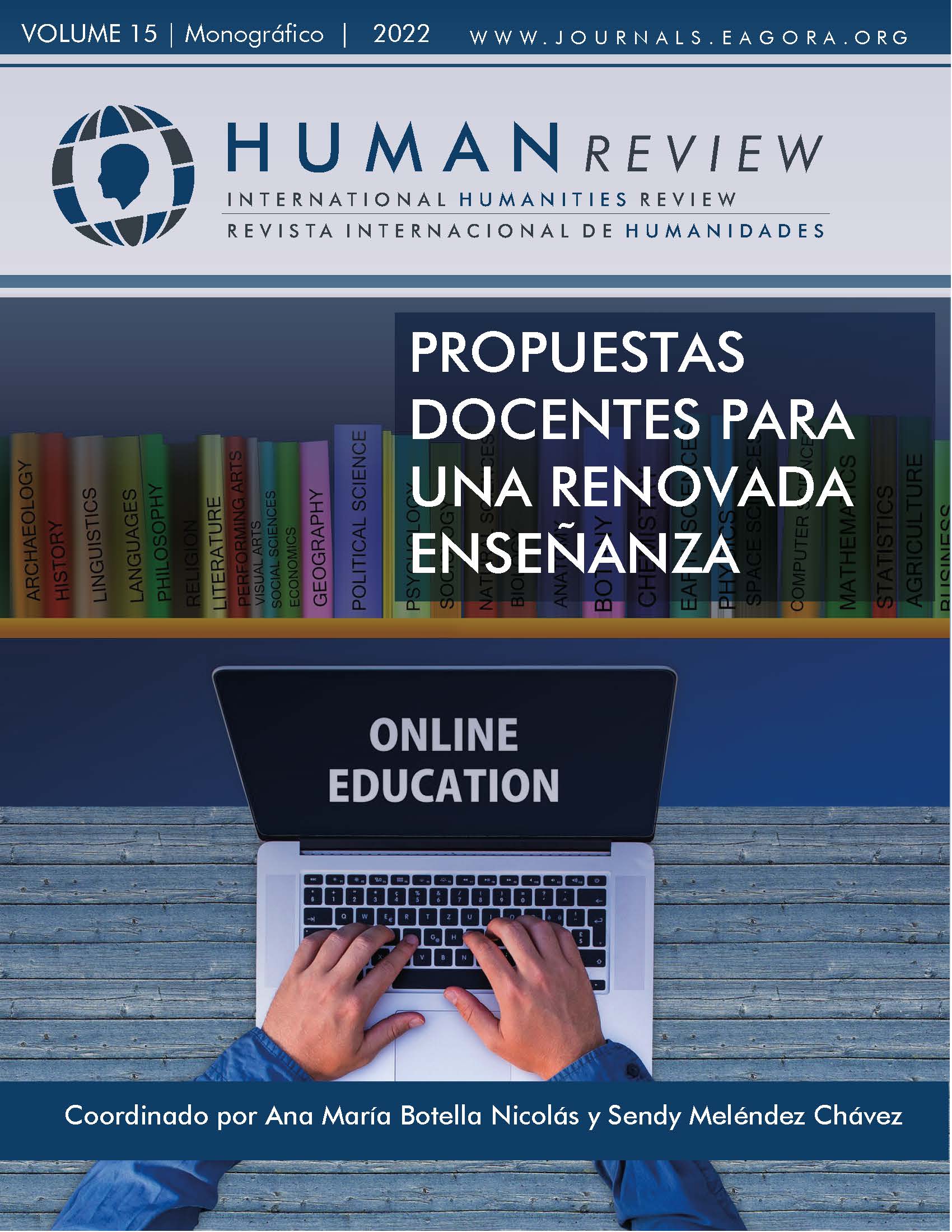Bachelor of science students’ perception of online classes during COVID-19 pandemic
A look at the e-learning process in Chile
DOI:
https://doi.org/10.37467/revhuman.v11.4231Keywords:
Covid-19, Online classes, Technology and learning, Bachelor of Science, University Santo TomásAbstract
The arrival of covid-19 in Chile caused an enormous change in its education system, strict confinement measurements were taken by the government which obligated students to continue their studies from in-person classes to online classes. The purpose of this study is to reveal the Bachelor of Science students’ perception of their online education prosses during 2020 and 2021 at the University Santo Tomás. A qualitative questionary of 32 questions was used to obtain and quantify the results. The results show that online education during pandemic times generated a range of factors such as stress, internet connection problems, access to technology and a lack of learning.
References
Atamara, T. (7 de abril de 2020). La educación virtual en tiempos de pandemia. UDEP Hoy. Blog de Noticias de la Universidad de Piura. https://www.udep.edu.pe/hoy/2020/04/la-educacion-virtual-en-tiempos-de-pandemia/
Aceves, J. y Safa, P. (2012) ¿De dónde viene el malestar social que hoy nos alarma? Espiral, XIX(54), 235-248. https://www.redalyc.org/articulo.oa?id=13824291008
Bates, A. T. (2018). Enseñar en la era digital. Guía para el diseño de la enseñanza y el aprendizaje. Pressbooks. https://cead.pressbooks.com.
Cai, Z., Fan, X. y Du, J. (2017). Gender and attitudes toward technology use: A meta-analysis. Computers & Education, 105, 1-13. https://doi.org/10.1016/j.compedu.2016.11.003
Cervantes Holguín, E. y Gutiérrez Sandoval, P. R. (2020). Resistir la Covid-19. Intersecciones en la educación de Ciudad Juárez, México. Revista Internacional de Educación para la Justicia Social, 9(3), 7-23. https://doi.org/10.15366/riejs2020.9.3.001
Dron, J. (2018). Smart learning environments, and not so smart learning environments: a systems view. Smart Learning Environments, 5(25), 1-20. https://doi.org/10.1186/s40561-018-0075-9
Fujimoto, G. (2020). El proceso educativo de la primera infancia en época del coronavirus COVID-19. Informe. Comisiones Académicas de la Red Hemisférica de Parlamentarios y Exparlamentarios por la Primera Infancia.
Lolas Stepke, F. (2020). Perspectivas bioéticas en un mundo en sindemia. Acta bioethica, 26(1), 7-8. http://dx.doi.org/10.4067/S1726-569X2020000100007
Martínez, G.A. y Jiménez, N., Análisis del uso de las aulas virtuales en la Universidad de Cundinamarca. Formación Universitaria, 13(4), 81-92 http://dx.doi.org/10.4067/S0718-50062020000400081
Ministerio de Educación (2020a). Protocolo N°2: Coronavirus COVID-19 en instituciones de educación superior. Gobierno de Chile. https://www.mineduc.cl/wp-content/uploads/sites/19/2020/03/ProtocoloCoronavirus_IES.pdf
Ministerio de Educación (2020b). Plan de acción MINEDUC para Instituciones de Educación Superior. Gobierno de Chile. https://educacionsuperior.mineduc.cl/wp-content/uploads/sites/49/2020/03/PLAN-DE-ACCION-EDUCACION-SUPERIOR-COVID-19-1.pdf
Murillo, F. y Duck, C. (2020). El Covid-19 y las Brechas Educativas. Revista latinoamericana de educación inclusiva, 14(1), 11-13. http://dx.doi.org/10.4067/S0718-73782020000100011
Muñoz Moreno, J. L. y Lluch Molins, L. (2020). Educación y Covid-19: Colaboración de las Familias y Tareas Escolares. Revista Internacional de Educación para la Justicia Social, 9(3) 1-17. https://revistas.uam.es/riejs/article/view/12182
Nava, A., & Grigera, J. (2022). Pandemia y protesta social en América Latina: tendencias, actores y demandas de la conflictividad social y laboral en Brasil, Argentina, Chile y Colombia. 2019-2020. Archivos de Historia del Movimiento Obrero y la Izquierda, (20), 111-138. https://doi.org/10.46688/ahmoi.n20.347
OMS (2020). Declaración sobre la cuarta reunión del Comité de Emergencia del Reglamento Sanitario Internacional (2005) sobre el brote de la enfermedad por el coronavirus de 2019 (COVID-19). https://www.who.int/es/news-room/
Paechter, M., Maier, B. y Macher, D. (2010). Students’ expectations of, and experiences in e-learning: Their relation to learning achievements and course satisfaction. Computers & Education, 54 (1), 222-229. https://doi.org/10.1016/j.compedu.2009.08.005
Pérez Fernández, F. (2004). El medio social como estructura psicológica, reflexiones del modelo ecológico de Bronfenbrenner. EduPsykhé, 3(2), 161-177. https://dialnet.unirioja.es/descarga/articulo/1071166.pdf
Rodríguez, H., Almeida, F., Figueiredo, V. y Lopes, S. L. (2019). Tracking e-learning through published papers: A systematic review. Computers & Education, 136, 87-98. https://doi.org/10.1016/j.compedu.2019.03.007
Ruiz Larraguivel, E. (2020). La práctica docente universitaria en ambientes de educación a distancia. Tensiones y experiencias de cambio. Universidad Nacional Autónoma de México, Instituto de Investigaciones sobre la Universidad y la Educación. http://132.248.192.241:8080/xmlui/handle/IISUE_UNAM/545
Sen, Amarty. (2007). Identity and Violence, The Ilusion of destinity. Penguin Books.
Von Braun, J., Zamagni, S. y Sorondo, M. S. (2020). The moment to see the poor. Science, 368(6488),213. https://doi.org/10.1126/science.abc2255
Downloads
Published
How to Cite
Issue
Section
License
Those authors who publish in this journal accept the following terms:
- Authors will keep the moral right of the work and they will transfer the commercial rights.
- After 1 year from publication, the work shall thereafter be open access online on our website, but will retain copyright.
- In the event that the authors wish to assign an Creative Commons (CC) license, they may request it by writing to publishing@eagora.org









